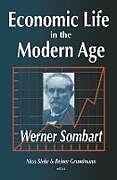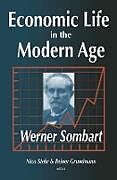Economic Life in the Modern Age
Einband:
Fester Einband
EAN:
9780765800305
Untertitel:
Englisch
Genre:
Allgemeines & Lexika
Autor:
Werner Sombart
Herausgeber:
Taylor and Francis
Auflage:
New.
Anzahl Seiten:
390
Erscheinungsdatum:
30.04.2001
ISBN:
978-0-7658-0030-5
Informationen zum Autor Werner Sombart Klappentext Werner Sombart (1863-1941) may well have been the most famous and controversial social scientist in Germany during the early twentieth century. Highly influential, his work and reputation have been indelibly tainted by his embrace of National Socialism in the last decade of his life. Although Sombart left an enormous opus spanning disciplinary boundaries, intellectual reaction to his work inside and outside of Germany is divided and ambivalent. Sombart consistently responded to the social and political developments that have shaped the twentieth century. Economic Life in the Modern Age provides a representative sampling of those portions of Sombart's work that have stood the test of time.The volume opens with a substantial introduction reviewing Sombart's life and career, the evolution of his major intellectual concerns, his relation to Marx and Weber, and his political affiliation with the Nazis. The editors' selection of texts emphasizes areas of Sombart's economic and cultural thought that remain relevant, particularly to those intellectual trends that seek a more broadly based, cross-disciplinary approach to culture and economics. Sombart's writings on capitalism are represented by essays on the nature and origin of the market system and the diversity of motives among the bourgeoisie and the proletariat. Also included is an excerpt from Sombart's controversial The Jews and Modern Capitalism, exploring the widely perceived relation between economic life and Judaism as a religion. In essays on the economics of cultural processes, Sombart's comprehensive and expansive idea of cultural science yields prophetic insights into the nature of urbanism, luxury consumption, fashion, and thecultural secularization of love. The volume's final section consists of Sombart's reflections on the social influences of technology, the economic life of the future, and on socialism, including the influential essay "Why is there no Socialism in the United States".Enca Zusammenfassung Werner Sombart (1863-1941) may well have been the most famous and controversial social scientist in Germany during the early twentieth century Inhaltsverzeichnis I: The Nature of the Economic Market System; 1: Capitalism; II: The Diversity of Economic Actors and Motives; 2: The Origins of the Capitalist Spirit; 3: The Proletariat; 4: The Bourgeois Past and Present; 5: The Significance of the Jewish Religion in Economic Life; III: The Culture of Economic Phenomena and the Economy of Cultural Processes; 6: The City; 7: The Secularization of Love; 8: Travel in Germany in 1800; 9: The Emergence of Fashion; IV: The Interaction of Economy, Technology, and Politics; 10: The Influence of Technical Inventions; 11: The Economic Life of the Future; 12: Why is there no Socialism in the United States?; 13: Socialism and the Social Movement...
Autorentext
Werner Sombart
Klappentext
Werner Sombart (1863-1941) may well have been the most famous and controversial social scientist in Germany during the early twentieth century. Highly influential, his work and reputation have been indelibly tainted by his embrace of National Socialism in the last decade of his life. Although Sombart left an enormous opus spanning disciplinary boundaries, intellectual reaction to his work inside and outside of Germany is divided and ambivalent. Sombart consistently responded to the social and political developments that have shaped the twentieth century. Economic Life in the Modern Age provides a representative sampling of those portions of Sombart's work that have stood the test of time.The volume opens with a substantial introduction reviewing Sombart's life and career, the evolution of his major intellectual concerns, his relation to Marx and Weber, and his political affiliation with the Nazis. The editors' selection of texts emphasizes areas of Sombart's economic and cultural thought that remain relevant, particularly to those intellectual trends that seek a more broadly based, cross-disciplinary approach to culture and economics. Sombart's writings on capitalism are represented by essays on the nature and origin of the market system and the diversity of motives among the bourgeoisie and the proletariat. Also included is an excerpt from Sombart's controversial The Jews and Modern Capitalism, exploring the widely perceived relation between economic life and Judaism as a religion. In essays on the economics of cultural processes, Sombart's comprehensive and expansive idea of cultural science yields prophetic insights into the nature of urbanism, luxury consumption, fashion, and thecultural secularization of love. The volume's final section consists of Sombart's reflections on the social influences of technology, the economic life of the future, and on socialism, including the influential essay "Why is there no Socialism in the United States".Enca
Inhalt
I: The Nature of the Economic Market System; 1: Capitalism; II: The Diversity of Economic Actors and Motives; 2: The Origins of the Capitalist Spirit; 3: The Proletariat; 4: The Bourgeois Past and Present; 5: The Significance of the Jewish Religion in Economic Life; III: The Culture of Economic Phenomena and the Economy of Cultural Processes; 6: The City; 7: The Secularization of Love; 8: Travel in Germany in 1800; 9: The Emergence of Fashion; IV: The Interaction of Economy, Technology, and Politics; 10: The Influence of Technical Inventions; 11: The Economic Life of the Future; 12: Why is there no Socialism in the United States?; 13: Socialism and the Social Movement

Leider konnten wir für diesen Artikel keine Preise ermitteln ...
billigbuch.ch sucht jetzt für Sie die besten Angebote ...
Die aktuellen Verkaufspreise von 6 Onlineshops werden in Realtime abgefragt.
Sie können das gewünschte Produkt anschliessend direkt beim Anbieter Ihrer Wahl bestellen.
Loading...
Die aktuellen Verkaufspreise von 6 Onlineshops werden in Realtime abgefragt.
Sie können das gewünschte Produkt anschliessend direkt beim Anbieter Ihrer Wahl bestellen.
| # | Onlineshop | Preis CHF | Versand CHF | Total CHF | ||
|---|---|---|---|---|---|---|
| 1 | Seller | 0.00 | 0.00 | 0.00 |
